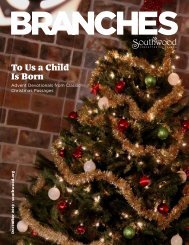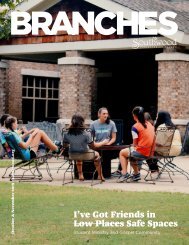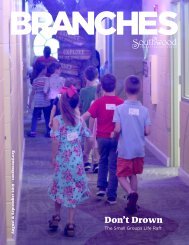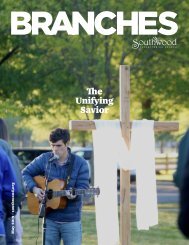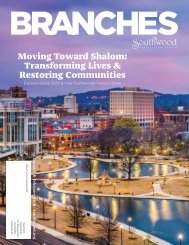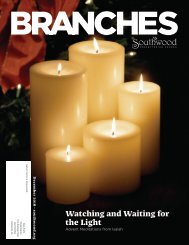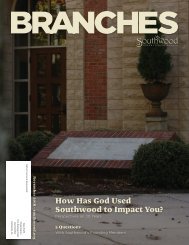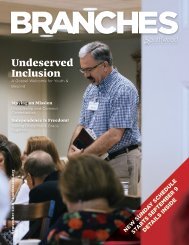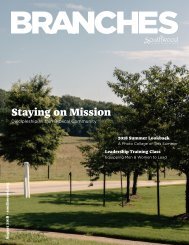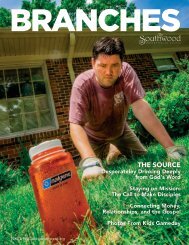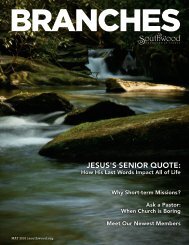You also want an ePaper? Increase the reach of your titles
YUMPU automatically turns print PDFs into web optimized ePapers that Google loves.
<strong>BRANCHES</strong><br />
ELECTION AFTERMATH<br />
vital christianity beyond<br />
the voting booth<br />
NOVEMBER <strong>2016</strong> | southwood.org<br />
photo montage<br />
from Harvest Heyday<br />
youth trip to Peru:<br />
the value of another perspective
SOUTHWOOD<br />
<strong>BRANCHES</strong><br />
DESIGNER Phillip Lackey<br />
CONTRIBUTORS<br />
Will Spink<br />
Ron Clegg<br />
Peter Render<br />
Niña Banta<br />
James Parker<br />
Winnie Winford<br />
Michael Moultrie<br />
Mary Morgan Plott<br />
overview<br />
COVER PHOTO<br />
A fun afternoon at Harvest HeyDay <strong>2016</strong><br />
CONTENTS<br />
3 pastor's note<br />
4 youth trip to peru<br />
The Value of Another Perspective<br />
5 ask a pastor<br />
It's a Matter of the Heart<br />
6 election aftermath<br />
Vital Christianity Beyond the<br />
Voting Booth<br />
8 harvest heyday photos<br />
Photo montage from HeyDay <strong>2016</strong><br />
10 gospel-driven racial reconciliation<br />
What Does It Look Like?<br />
PHOTOS<br />
Phillip Lackey<br />
Kim Delchamps<br />
Winnie Winford<br />
Pete Meenen<br />
Southwood Members<br />
FEEDBACK!<br />
We want to hear from you! Please send<br />
your suggestions and comments to<br />
branches@southwood.org<br />
1000 CARL T. JONES DRIVE | HUNTSVILLE, ALABAMA 35802<br />
(256) 882-3085 | WWW.SOUTHWOOD.ORG<br />
CHURCH STAFF<br />
NIÑA BANTA Director of Children's Ministry<br />
RITA CLARDY Executive Assistant<br />
SHANNON CLARK Administrative Assistant<br />
RON CLEGG Assistant Pastor, Shepherding<br />
JANICE CROWSON Director of Facilities/Finance<br />
KIM DELCHAMPS Administrative Assistant<br />
TERRI GOOD Accountant/Bookkeeper<br />
PHILLIP LACKEY Graphic Designer<br />
SARAH NIEMITZ Director of Community Development/Assimilation<br />
JAMES PARKER Chief Musician<br />
PETER RENDER Director of Youth/Families<br />
ANGELA SIERK Assistant Director/Children's Ministry<br />
WILL SPINK Senior Pastor<br />
WINNIE WINFORD Assistant Director/High-Life<br />
11 all that is fair<br />
In Christ There Is No East or West<br />
UPCOMING EVENTS<br />
Small Group Leader Lunch<br />
<strong>November</strong> 6<br />
Telling God's Story Lunch<br />
<strong>November</strong> 13<br />
Second Mile Secret Santa Collection<br />
<strong>November</strong> 13 through 20<br />
Deck the Halls<br />
<strong>November</strong> 20<br />
Office Closed<br />
<strong>November</strong> 23 through 25<br />
2 NOVEMBER <strong>2016</strong> | SOUTHWOOD.ORG
PASTOR’S NOTE<br />
How Important is Thanksgiving?<br />
This month we will gather with families,<br />
consume tons of food, and overdose on<br />
football games, all in the context of giving<br />
thanks for the blessings of life. Giving thanks is<br />
a great thing for us to do and is something well<br />
worth celebrating, but do we understand what<br />
being thankful means? Being thankful is a part<br />
of having good manners, and it is an aspect of<br />
good biblical character. That said, we must go<br />
even further. Putting it negatively, if I am not<br />
thankful, I demonstrate the heart of an idolater.<br />
From a positive angle, a thankful heart is a key<br />
sign of the presence of faith.<br />
In Romans 1, Paul writes of how mankind, apart<br />
from Christ, is in open rebellion against their<br />
Creator. A pivotal section in that description<br />
of fallen human nature is verses 21-23: “For<br />
although they knew God, they did not honor<br />
him as God or give thanks to him, but they<br />
became futile in their thinking, and their foolish<br />
hearts were darkened. Claiming to be wise,<br />
they became fools, and exchanged the glory<br />
of the immortal God for images resembling<br />
mortal man and birds and animals and creeping<br />
things.” Man, in the ultimate expression of folly,<br />
exchanged rightful worship of the Creator for<br />
twisted worship of the creation with himself at<br />
the pinnacle. To get to that place, man refused<br />
to give God two critical things—honor and<br />
thanks.<br />
Why are these so critical? Honor exalts God<br />
and puts Him in His rightful place as God and<br />
King. Man’s rebellion attempted to usurp that<br />
high place God alone deserved. Refusing<br />
to give thanks pertains to man’s thinking of<br />
himself. Not only did he lower his image of<br />
God, but he also elevated himself. You do<br />
not generally give thanks for what you earn or<br />
what you are entitled to. You give thanks for<br />
what is not deserved or for assistance given in<br />
time of need. You give thanks for mercy, not<br />
justice. You give thanks for things you cannot<br />
provide for yourself. Therefore, only a contrite,<br />
dependent person who sees himself as needy<br />
and undeserving will be thankful. A proud,<br />
self-sufficient person who demands his due<br />
will consider what he has as the produce of<br />
his own hands. In that state being thankful is<br />
not required. So, when we are not thankful, we<br />
demonstrate our natural twisted tendency to<br />
worship self rather than our gracious Creator.<br />
What does this look like on a daily basis?<br />
When I complain instead of giving thanks, even<br />
about something trivial like the weather, I am<br />
making statements that I don’t often realize.<br />
I am saying that God made a mistake. He<br />
should have known better than to allow it to<br />
be so hot! If He had only listened to me. I<br />
refuse to honor Him as God, and instead I<br />
worship myself. Complaining also says that I<br />
am entitled to something better. Ingratitude<br />
takes for granted the gracious gift of family,<br />
material possessions, and experiences, and<br />
says, whether consciously or not, that I am not<br />
needy. I accomplished all of this. I do not need<br />
a benefactor. I am enough.<br />
Sadly, my life often reflects this idolatrous<br />
approach to life. I need Thanksgiving Day to<br />
call me back to a right comprehension of who<br />
God is and who I am. In that day I need to thank<br />
God, not just be generically thankful. He alone<br />
can and will provide for all of my needs. I also<br />
need to thank God not only for things I have but<br />
also for the mercy I have received in Christ. In<br />
myself I am needy beyond my understanding,<br />
but in Christ I am given everything. In Christ<br />
I receive the lavish grace of fulfilled justice for<br />
my sin. In Christ I am being made new. I am no<br />
one outside of Christ, but in Him I am all that I<br />
was made to be. All that I can be thankful for,<br />
and hopefully I’ll be thankful for more than just<br />
one day of the year.<br />
Ron Clegg<br />
Assistant Pastor<br />
If you would like to contact<br />
Ron, use the following:<br />
ron.clegg@southwood.org<br />
NOVEMBER <strong>2016</strong> | SOUTHWOOD.ORG 3
YOUTH TRIP TO PERU<br />
THE VALUE OF ANOTHER PERSPECTIVE<br />
by Winnie Winford<br />
Most people have had the experience of driving down the<br />
road and having a passenger exclaim, “Watch out!” In that<br />
moment it is terribly tempting to get frustrated at the gasping<br />
passenger. Some people, perhaps even a person on staff with<br />
a youth ministry, get defensive and want to suddenly prove that<br />
she does not need help with anything ever and that she has all<br />
things under control at all times.<br />
But the truth in that moment is that the passenger exclaims<br />
because she has a different perspective and could see a danger<br />
that the driver could not see. The passenger speaks out in love<br />
and care, willing to take whatever response gets lashed out at<br />
her in order to bring helpful information to light.<br />
Often the Lord uses others to bring light to the darkness in our<br />
lives. Such is the case for many of the students and adults who<br />
have gone on the youth trip to Peru. The students and adults<br />
alike have expressed the honored blessing they have received<br />
from being exposed to a perspective different from their own.<br />
They have communicated what a privilege it is to hear of God’s<br />
love and care in the lives of people no matter the circumstance.<br />
The Southwood Peru team will travel again next summer to the<br />
mountains of Peru in order to serve and build relationships with<br />
boys who live at a group home. The boys have fewer material<br />
possessions than the Southwood team and are living in the<br />
home because of difficult family situations. The Southwood<br />
team has consistently found that they end up being served<br />
by the boys much more than they serve. With their limited<br />
resources, the boys overwhelm the team with a welcoming spirit<br />
and concern for the American team’s wellbeing. They long to<br />
share God’s blessings with the team, both material and spiritual.<br />
Over campfires and the brightly starlit nights, the boys have<br />
been willing to share with the team how they have seen the<br />
Lord’s faithful work in their lives.<br />
What a humbling experience to be reminded that God is a<br />
faithful God when times are hard and when times are easy, when<br />
the harvest is plentiful and when one’s soul feels in drought.<br />
There is a deep and rich advantage in spending a week with<br />
these boys who long to share their stories of God’s strong refuge<br />
in their lives. One cannot help but walk away humbled by their<br />
stories and service and reminded of ways in which the believer<br />
often seeks things other than God. What a beautiful reminder<br />
to consider the cross and its central importance in all of our lives.<br />
When the Lord uses another person and their viewpoint to reveal<br />
your need for him, what is your response? How often do you<br />
intentionally engage a person who has a different point of view<br />
from your own? Consider asking a Peru team member whom you<br />
have sent how seeing a different perspective has impacted their<br />
understanding of God. Here are two of their answers.<br />
When I was in Peru, one difference I noticed<br />
was how important "family" was. In church, I<br />
would usually hear the phrase "brothers and<br />
sisters in Christ," and in Kusi that seemed to<br />
have a much stronger meaning than I had<br />
ever thought about. It was great to be able<br />
to take my Peru experiences and apply them in my life as I met<br />
new people and started building relationships after moving<br />
to college. I also feel that it strengthened my relationship in<br />
Christ because I got to witness how blessed I was in my life, and<br />
how He wants me to treat everyone I meet the same way I was<br />
treated in Peru—like family. —Michael Moultrie<br />
Going to Peru showed me just how much of<br />
a little “Christian bubble” I had grown up<br />
in. God’s love for His people isn’t affected<br />
by skin color, language or social status.<br />
Despite the few material items they have,<br />
they considered themselves abundantly<br />
blessed by God. They don’t view the circumstances they have<br />
been placed in as something negative. God’s love for them is<br />
worth so much more than money or materialistic things. My<br />
biggest takeaways from the Peru trip would be to find joy in all<br />
situations and to look past differences because Christ loves us<br />
all the same. —Mary Morgan Plott
anches<br />
SOUTHWOOD<br />
ASK A PASTOR<br />
Q<br />
It's a<br />
Matter<br />
of the<br />
Heart<br />
by Peter Render<br />
Why are today's<br />
youth so ungrateful?<br />
A<br />
This issue seems to be on the top of the mind<br />
for many people these days. Be it viral videos<br />
showing students, some of them young children,<br />
being disrespectful to teachers and other authority<br />
figures, the questioning and dishonoring of longheld<br />
cultural traditions by those same students, or the general<br />
perception that these youth are expectant of and entitled to<br />
some sort of preferential treatment, if the issues are drilled into<br />
deep enough, it seems to come down to the reality that kids today<br />
are ungrateful. At the same time, we all know the exception that<br />
proves the rule. Whether it is our own child(ren), kids from "my<br />
church," or some other tribe of youth with some commonality, it<br />
is not all youth that suffer from being ungrateful. But it is most of<br />
them, right?<br />
People are hard. People are difficult. People are ungrateful. One<br />
of the helpful things about a question like this is that we do not<br />
have to look too far to begin answering it. As with any question<br />
which poses "us vs. them," the answer to this question probably<br />
begins with a dose of Matthew 7:5 followed by a long look in the<br />
mirror. Make no mistake—this question presupposes a superior<br />
moral high ground, usually occupied by the asker.<br />
All of us who are members of the church are charged with the<br />
care of our youth. Parents are charged to raise their children in<br />
the nurture and admonition of the Lord, as sort of a functional<br />
Proverbs 22:6. Other members of the church are charged to assist<br />
these parents in the Christian nurture of these children. Both of<br />
these charges assume a primary thing, that we humbly rely upon<br />
God’s grace and set before them a godly example.<br />
The ugly and simple fact is, I am ungrateful. I will let one stressful<br />
moment ruin the rest of my day, causing me to react in distress to<br />
those around me. I will look back on any given day and only recall<br />
the things that caused me problems. I will sit back on a Saturday<br />
evening and consider my week and be impressed with myself that I<br />
could survive such hardships as my life offers. This is where I linger,<br />
impressed with myself and less impressed with those around me.<br />
Thankfully, Jesus meets us in these places. True gospel<br />
transformation is the only hope that any of us have to be truly<br />
grateful. You, me, the youth of today, and the generations of<br />
yesterday all have one hope, and that is that we can identify<br />
with the God of the universe as he proceeds on his mission to<br />
reconcile all things to himself through his Son. Unfortunately, we<br />
have thrown a stick in the spokes of this tire’s mission. We actively<br />
choose ourselves over God. And God loves us anyway.<br />
The answer to a youth who is ungrateful is humble repentance.<br />
Interestingly enough, that is also the answer for a youth pastor<br />
who is ungrateful. That is also the answer for the youth parent<br />
and the critical youth observer. We are all members of the same<br />
community of believers. We are a community that is being shaped<br />
and molded by the Holy Spirit operating in us individually and<br />
corporately. Sanctification is a grace-filled, transformational<br />
process that only exists when the Gospel is embraced from the<br />
heart. Parenting paradigms, political motivations, and social<br />
conventions change. Pushing back against them is only seeking<br />
behavior modification. The heart of this matter of gratefulness is a<br />
matter of the heart. All of our hearts need gospel transformation.<br />
NOVEMBER <strong>2016</strong> | SOUTHWOOD.ORG 5
ELECTION AFTERMATH<br />
Vital Christianity Beyond the Voting Booth<br />
by Will Spink<br />
In recent weeks and months, pastors, bloggers, and analysts of all<br />
sorts have spilled plenty of ink in discussing how to be a Christian<br />
on <strong>November</strong> 8. To read the articles, one would think that day<br />
will be the most significant in the history of American Christianity<br />
and that decision in the voting booth the most consequential<br />
American Christians will ever make. Yet in spite of (or perhaps<br />
to some extent because of) all this flurry of passion and analysis,<br />
many Christians remain confused, uncertain of how they will vote,<br />
unclear on how they should feel about the current climate in their<br />
country.<br />
While not seeking to denigrate the importance of thoughtful<br />
involvement on Election Day, this article will not even attempt<br />
to clear up that particular confusion—and it’s quite unlikely that<br />
the Bible will announce a late-breaking endorsement of any<br />
candidate! Instead, this article will ask a perhaps more significant<br />
question and one to which the Bible gives all followers of Christ<br />
some clear answers and direction: What does it look like to live as<br />
a Christian on <strong>November</strong> 9 (and all the days to follow)?<br />
The Church of Jesus Christ is predicted by many experts to have<br />
a significant impact on <strong>November</strong> 8, but it is promised by God<br />
himself to have a significant impact on the rest of history. The<br />
Church must consider now what a faithful witness will look like<br />
then or risk falling into the trap of short-sighted pride or despair.<br />
The Bible calls God’s people to many things, of course, but here<br />
are three particularly needful beginning on <strong>November</strong> 9, <strong>2016</strong>.<br />
TRUST THE TRUE KING<br />
When we wake up on <strong>November</strong> 9, the White House will have a<br />
new prospective occupant; the Throne of Heaven will have the<br />
same one as always. Now doubtless that statement can be a trite<br />
truism thrown around without much meaning, but sometimes it’s<br />
easy to forget that the authority of the most powerful leader in<br />
the world pales in comparison to and ultimately comes from the<br />
sovereign King of Kings.<br />
This is why God consistently warns his people to “put not their trust<br />
in princes, in a son of man, in whom there is no salvation” (Psalm<br />
146:3). Blessing, rather, is found in placing one’s hope in the God<br />
of Jacob, who reigns forever, the psalmist says. Functionally living<br />
this way provides the people of God comfort and hope because<br />
one who shares their values is always in control. The next president<br />
may appoint cabinet members and Supreme Court justices, but<br />
the ultimate “balance of power” will remain intact: YHWH reigns,<br />
and therefore we have unfading hope!<br />
Election cycles are good at revealing one particular idol in my<br />
heart: power—or control. I remember as a boy rooting for the San<br />
Antonio Spurs to win the NBA Championship because their star<br />
player, David Robinson, was an outspoken Christian, so clearly<br />
(I assumed) his team’s gaining success and influence would best<br />
advance God’s kingdom. Sound silly? Isn’t that how we’re often<br />
prone to think the world will be impacted for Christ—by getting<br />
power and exerting our ever-expanding influence?<br />
Yet time after time the Bible makes clear that God’s strength<br />
typically works not from the top down, through human might, but<br />
rather from the bottom up, through the poor and weak. In fact, as<br />
we see in the book of Daniel and elsewhere, God uses apparent<br />
defeat to bring ultimate blessing to his people and honor to his<br />
name. Nebuchadnezzar appears to have the upper hand, to have<br />
greater power than YHWH, to be exerting greater influence in the<br />
6 NOVEMBER <strong>2016</strong> | SOUTHWOOD.ORG
anches<br />
SOUTHWOOD<br />
world. He’s got the votes, the positions of power, and the military<br />
might. And yet God is controlling the king’s every move, and<br />
no one has unseated the Ancient of Days from his throne. And<br />
that’s the glorious and eternal hope the prophet offers to God’s<br />
seemingly displaced and disenfranchised people.<br />
How did Jesus himself impact his society? By amassing votes? By<br />
associating with the influential? By accruing political capital? Quite<br />
the opposite. The “friend of tax collectors and sinners” attracted<br />
the poor, alienated the religious elite, and ended up being<br />
sentenced to death by those in power. The pattern of kingdom<br />
impact that Jesus sets is one that features humility and human<br />
weakness—highlighted by his apparent defeat in his death on<br />
the cross—and it is the one from which his Church has seen the<br />
greatest fruit for centuries.<br />
It’s vital, then, that while we pursue justice and pray for excellent<br />
leaders, we also remind our hearts to trust the true King whether<br />
our preferred candidate is elected or not. A Church that despairs<br />
due to the results of an election or a Church that declares ultimate<br />
victory due to the results of an election would be a Church that has<br />
ceased to depend on her Sovereign King and to follow his pattern<br />
for cultural impact. A Church, however, that remains confident and<br />
hopeful regardless of the outcome of an election testifies to the<br />
treasure of a heavenly citizenship, a mighty King of Kings, and an<br />
eternal inheritance that no one and nothing on earth can diminish.<br />
PRAY FOR THE PRESIDENT<br />
This may seem obvious, but emotions have run so high and attacks<br />
have been so demeaning that many will find it easier to desire<br />
failure than success for the next president. So let’s not forget that<br />
one of the implications of God being the True King is that no one<br />
has any authority unless God establishes it. We may argue about<br />
the reasons why God would give such a president to our country,<br />
but regardless He will be the one who does so.<br />
God is very clear that we are to pray for those in all places of<br />
authority (I Timothy 2:1-3), and the basis seems to be connected to<br />
the admonition in Jeremiah 29 to seek the welfare of “Babylon” or<br />
whatever other land where we find ourselves in exile. The blessing<br />
of the leader means blessing and prosperity for all the people. And<br />
before we give up on anyone—no matter how big a failure—let’s<br />
remember that in particular the hearts of kings are mentioned as<br />
being in God’s hand and controlled by him in whatever direction<br />
he pleases (Proverbs 21:1).<br />
So, let’s start praying now… for whoever it may be. As our<br />
Confession of Faith teaches us, God’s Word will call us to “pray<br />
for,” “honor,” and “be subject to” someone we may find quite<br />
difficult to respect. The best way to begin moving our hearts<br />
in that direction with anyone we struggle to love or respect is<br />
sincerely to pray for their good, to ask for God’s blessing on them,<br />
and to ask God to change our hearts that we might genuinely<br />
seek their welfare.<br />
LOVE THOSE WHO DIFFER<br />
In a way I’ve not witnessed in a presidential election season<br />
before, people are calling those on the other side unreasonable,<br />
misguided, or disingenuous for voting differently from them—<br />
and then sitting in the same pews on Sundays. The number of<br />
people assuming “all good Christians” will vote the way they are<br />
(or are not) voting is remarkable. How do you feel about someone<br />
handling their <strong>November</strong> 8 decision different from you? How does<br />
Christ call you to treat fellow Christians who nonetheless think<br />
differently from you on this?<br />
Brothers and sisters, this is a huge challenge for the Church today.<br />
The question is not where “evangelicals” throw our weight around<br />
on Election Day but how we show our love for each other afterwards.<br />
Are we preparing now to love and seek to understand those who do<br />
on <strong>November</strong> 8 what we consider unconscionable? We must! That<br />
is the mark of those who follow Christ—that we love each other in<br />
spite of our differences for Jesus’ sake!<br />
And this need is true, of course, beyond the Church. Whether we<br />
consider things politically, ethnically, or socioeconomically, our<br />
nation as a whole seems to be highly polarized, and not many<br />
would argue that any decision on <strong>November</strong> 8 will change that<br />
reality very much. We say we long for a “unifier,” who will break<br />
down these barriers and “reach across the aisle” to bring us<br />
together, but we consistently pull back to our own corners, defend<br />
our own positions, and push our elected leaders to implement our<br />
own preferences.<br />
Brothers and sisters, no man or woman has the power to break<br />
down barriers between people single-handedly, but we are the ones<br />
with the gospel of Jesus Christ, the hope of glory that promises to<br />
unite those radically divided by ethnicity, class, religious or political<br />
background (Ephesians 2, Galatians 3:28). God has called you and<br />
me to carry a message not of division but of reconciliation—with<br />
God first and as a result, then, with each other. We must speak truth<br />
with love, not venom. We must build bridges, not barricades. We<br />
must point to Christ the King, not any human leader.<br />
I usually love watching election returns, doing the math, watching<br />
the trends. It’s interesting to watch and learn about the culture in<br />
which God has placed us. This year on the evening of <strong>November</strong> 8,<br />
I’m scheduled to be in a Session meeting, and I’m glad. I suspect<br />
it will be a room where people will have cast votes that day for<br />
multiple different candidates. I know it will be a room where we will<br />
be preparing for <strong>November</strong> 9 and the days that follow—praying<br />
for our next president to the True King and asking him to make us<br />
gracious messengers of reconciliation for the sake of Huntsville,<br />
America, and the world.<br />
NOVEMBER <strong>2016</strong> | SOUTHWOOD.ORG 7
<strong>2016</strong>
What Does Gospel-driven<br />
Racial Reconciliation Look Like?<br />
by Ron Clegg<br />
This is a hot topic in our day that does not sidestep the Church.<br />
You would think that Christians, those who love and follow<br />
Christ, would be at the forefront in the battle for reconciliation.<br />
Many are. Yet history has shown us the Church is not immune<br />
from society’s ills and sometimes finds herself even inflaming<br />
these ills. The PCA, our denomination, in her early years was<br />
complicit in defending and even furthering segregation and<br />
systemic racism. Even now many of our well intentioned efforts<br />
to bring unity among ethnic groups do as much harm as good.<br />
The problem is that the issue is highly complicated. It is not<br />
simply a matter of not hating those of other ethnic groups. It<br />
involves economics, cultural values, social and governmental<br />
systems, and more. It is an issue of which ethnic group has<br />
the dominant position and can determine society’s values.<br />
It involves many things most of us in white, middle-class,<br />
suburban, evangelical America just do not understand, because<br />
we are a part of the dominant culture. We have little idea of what<br />
life is like in the minority. So, how does a predominantly white,<br />
middle-class, suburban church like Southwood further healing<br />
in our community? This is such an important and challenging<br />
question that the Southwood Session has formed a committee<br />
to lead us in considering our role. As we have begun to read,<br />
listen, and pray, we have realized how much we have to learn,<br />
and we've also recognized a vital first step.<br />
This first step might sound simple, but it might also be the<br />
most difficult—build relationships. To do this we must think<br />
like missionaries. When we moved to Hungary in 2001, our<br />
first challenge was getting to know Hungarians. That involved<br />
crossing a lot of barriers, language being one of the biggest.<br />
You could be easily fooled that you had adequate knowledge<br />
of what these people were like and what made them tick. They<br />
generally looked like you. They listened to some of the same<br />
music and watched some of the same movies. But underneath<br />
they were radically different, even from other Europeans. They<br />
lived for centuries under authoritarian rulers from outside<br />
Hungary. Throughout their history they were beaten down and<br />
oppressed, which greatly affected their psyche. At the same time,<br />
they highly valued family and close friends. They were warmly<br />
hospitable once they knew you well enough. To get down to<br />
these differences in life experience, you had to spend time with<br />
them, talk to them by telling them your story and listening to<br />
theirs. You, the foreigner, had to take the initiative in gaining this<br />
depth of understanding by being in their world and in their lives.<br />
This is the way we also must attack racial reconciliation. If you're<br />
like me, you live in a community of like-minded and like-faced<br />
people. We don’t consciously harbor ill will towards others who<br />
are different, but we also don’t know them or understand their<br />
life experience. How can the Church begin to bring the Gospel<br />
to bear effectively on this societal challenge if we don’t fully<br />
understand the issue? We have to take the initiative and build<br />
bridges of understanding and compassion. I spoke to a black<br />
pastor recently about all this, and his answer to what we could<br />
do was simple and straightforward: build relationships. Get into<br />
the lives of people in other ethnic groups to the point that you<br />
begin to taste their experience, their values, and their world<br />
outlook. This is the ruling principle with ministry to any people<br />
group. I cannot bring the Gospel to bear on a life I do not know.<br />
Of course, Jesus was the great example. He crossed eternal<br />
barriers to enter humanity, taking upon Himself our experience.<br />
In that personal identification, He can effectively help us in our<br />
need. He knows us. He knows our pain. He knows our situation.<br />
He feels the weight we carry. He speaks our language. This is<br />
how we demonstrate the Gospel to our fractured society. We<br />
build bridges of knowledge and understanding by crossing<br />
barriers that divide, in order to enter into the world of another<br />
that they might understand how the Savior has done that for us.<br />
SESSION UPDATE<br />
The Session would like to thank everyone who helped out with<br />
HeyDay – both formally and informally. What a great afternoon<br />
together! Perhaps the only thing more exciting than the dunk tank<br />
was the number of neighbors, guests, and kids who joined us and<br />
received a warm welcome from the people of Southwood.<br />
In case you were not present in the worship service that Sunday<br />
morning (Oct. 23), we announced then the approval of a playground<br />
project that has been in discussion and planning for the past<br />
couple of years. The new playground will cover basically the same<br />
footprint as the current playground but provide updated and more<br />
age-appropriate equipment for our kids to improve the safety and<br />
utility of the playground for years to come. The Children’s Ministry<br />
Committee has been working on these plans, and the Diaconate<br />
and Finance Committee worked carefully to find the best timing<br />
from a stewardship perspective to make this decision. Pray with us<br />
in the coming months as you see the work begin that God would<br />
use this new playground to welcome many kids and families into<br />
his kingdom and the joys of relationships in the family of God.<br />
Thank you for your faithful giving that has allowed for regular<br />
needs and a project like the playground to be addressed without<br />
the need for a special capital campaign. We are grateful for God’s<br />
good provision and ask for your continued support toward the end<br />
of this year as we take on these projects and seek to fill out our<br />
approved staff positions. Join us in praying for God’s provision and<br />
direction for Southwood.
ALL THAT IS FAIR<br />
IN CHRIST THERE IS<br />
NO EAST OR WEST<br />
by James Parker<br />
SOUTHWOOD<br />
Mavis Staples was born in Chicago in 1939. She is an R&B/Gospel<br />
artist whose career has spanned the last 66 years. She got started<br />
in 1950 singing with her family's gospel act, The Staples Singers.<br />
Through the years, the Staples Singers, and Mavis herself, have<br />
had tons of hits and notoriety. Her father, Roebuck "Pops"<br />
Staples, was the leader of the Staples Singers. "Pops" was a close<br />
personal friend of Martin Luther King, Jr. In the '60s their music<br />
became a megaphone for the civil rights movement. So much<br />
of what they did then, and what Mavis has continued to do, was<br />
inspired by their involvement with King.<br />
Fast-forward to 2010... Mavis is in the process of reinventing herself<br />
as an artist. She starts working on various collaborations with<br />
popular, indie, or even country artists. In 2010 she finished work<br />
on an album called You Are Not Alone, a collaboration with Jeff<br />
Tweedy from the band Wilco. It was recorded in Muscle Shoals,<br />
and sounds like it too! It's really gritty and unpolished and creates<br />
a perfect backdrop for the raw emotiveness of Mavis' voice. The<br />
album contains old gospel songs, some Staples Singers songs, a<br />
Tweedy original, and Mavis' retelling of this old hymn, "In Christ<br />
There Is No East or West."<br />
I love the selection of this hymn for the album. Mavis is a civil<br />
rights crusader. She has fought for justice for the underserved and<br />
marginalized—not just for the sake of her immediate community<br />
but for the benefit of all humanity. This hymn captures that ideal.<br />
It's the rhetoric of Dr. King. "...We will be able to speed up that<br />
day when all of God's children, black men and white men, Jews<br />
and Gentiles, Protestants and Catholics, will be able to join hands<br />
and sing in the words of the old Negro spiritual: 'Free at last!<br />
Free at last! Thank God Almighty, we are free at last!'" It is also<br />
the sentiment of Jesus... Matthew 8:11 says "I tell you, many will<br />
come from east and west and recline at table with Abraham, Isaac,<br />
and Jacob in the kingdom of Heaven." Also Matthew 12:48-50<br />
says, "But he replied to the man who told him, 'Who is my mother,<br />
and who are my brothers?' And stretching out his hand toward<br />
his disciples, he said, 'Here are my mother and my brothers! For<br />
whoever does the will of my Father in heaven is my brother and<br />
sister and mother.'"<br />
When you take those huge gospel-centered reconciliation concepts<br />
and marry them to the experiences and grit of Mavis Staples, this<br />
hymn takes on a new meaning. True Gospel reconciliation between<br />
groups who have been at war is something that is beautiful but<br />
difficult. It produces indelible scars of struggle and suffering.<br />
That's true of the civil rights movement, denominational or<br />
congregational fights, marriage and family turmoil, and ultimately,<br />
the rift between a holy god and a lovely, but diminished, imagebearing<br />
human race. When you hear this retold with the weathered<br />
power of Mavis' unmistakeable voice, you don't just understand<br />
this; you can feel it too! Isn't that what good art is supposed to<br />
do? Tell us something about ourselves that transcends the merely<br />
propositional and reaches for the uncharted skies of our hearts?<br />
In Christ there is no East or West,<br />
No North or South;<br />
Only one great love<br />
Inside and out.<br />
True hearts everywhere<br />
Some deaf and some blind<br />
Singin' one melody<br />
Lost souls cannot find.<br />
Join hands and have faith,<br />
Whatever your race may be!<br />
Who serves my Father as a son<br />
Is surely kin to me.<br />
In Christ now meet both East and West,<br />
There is no black or white<br />
Only one great love<br />
Hatred cannot divide.<br />
Join hands and have faith,<br />
Forgive your enemy<br />
Surely we're all a part<br />
Of one big family.<br />
Join hands and have faith,<br />
Whatever your race may be!<br />
Who serves my Father as a son<br />
Is surely kin to me.<br />
Join hands and have faith,<br />
Forgive your enemy<br />
Surely we're all a part<br />
Of one big family.<br />
NOVEMBER <strong>2016</strong> | SOUTHWOOD.ORG 11
SANTA’S<br />
SECRET<br />
SHOP<br />
with Second Mile<br />
Donate new toys <strong>November</strong> 13th through the 20th<br />
<strong>2016</strong> CHRISTMAS WISH LIST:<br />
Girls' Stuff:<br />
Baby Alive: any variety of doll, different races, learning to Go potty, Go to doctor, etc.<br />
Make up Kits/Hair kits, shower gel/lotion kits, Ear Buds<br />
Play Doh kits: Dentist, Cooking, etc.<br />
Boys' Stuff:<br />
Legos: Star Wars, Transformers, Large kits<br />
Axe Bodywash Kits/shaving kits<br />
skateboards & helmets, Ear Buds<br />
TOYS THAT AREN'T AS POPULAR:<br />
disney princesses, Barbies, Stuffed Animals, scooters,<br />
Footballs/Basketballs/Soccer Balls<br />
More Stuff:<br />
V-tech educational toys: Watches,<br />
game/learning systems, etc.<br />
Bicycles (from training wheels up<br />
to 26” bikes) for girls & boys<br />
Alabama & Auburn items





